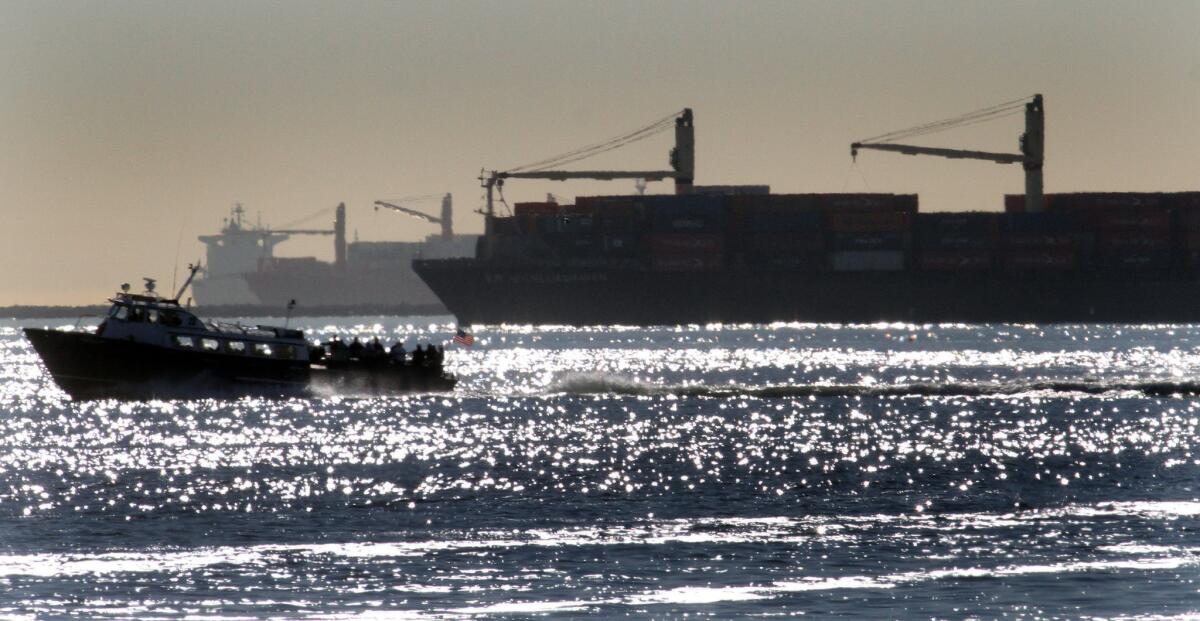Shipping lines and dockworkers reach deal; port shutdown averted

Shipping companies and dockworkers reached a tentative deal late Friday on a new labor contract, avoiding a shutdown of 29 ports that would have choked off trade through the West Coast.
The agreement, which still needs approval from union members and individual employers, should start easing severe congestion thatâs been building for months at the nationâs busiest ports, in Los Angeles and Long Beach, along with other major gateways.
Details of the proposed five-year contract for about 20,000 West Coast dockworkers were not released. The dockworkers have been without a contract since July. The two sides had been negotiating since May.
The dispute caused businesses across the nation to lose money because imports were trapped on boats and exports trapped on land.
âWe heard from small-business owners, large-business owners, farmers who couldnât get their produce or their meat to market,â U.S. Labor Secretary Thomas Perez told reporters in San Francisco, where he joined contract talks this week to push for a settlement.
âThis is now in the rear-view mirror,â Perez said. âA significant potential head wind for this economic recovery has been removed.â
The deal alleviates fears of a protracted shutdown that had intensified as negotiations stalled. In recent weeks, the employers â major shipping lines and cargo terminal operators â intermittently halted the loading and unloading of ships while accusing the union of staging work slowdowns.
The talks between employer group Pacific Maritime Assn. and the International Longshore and Warehouse Union were the most contentious since 2002, when employers accused the dockworkers union of engaging in slowdown tactics and locked out workers for 10 days.
Trade experts cautioned that the new contract wonât immediately resolve the delays, particularly at L.A. and Long Beach, which together handle roughly 40% of the nationâs incoming container cargo.
It will take weeks, if not months, just to clear the current backlog, port officials said.
The congestion stems in part from issues unrelated to the labor dispute. Before slowdown accusations surfaced in early November, the L.A and Long Beach ports already were struggling with the worst freight backlog in a decade, in large part because of a truck trailer shortage and the increased use of mammoth container vessels that hold more cargo.
At the Port of Los Angeles, a single ship often carries 14,000 containers. Two years ago, a large ship would have held 8,000 to 10,000 of the steel boxes.
âThese terminals were sized, in some cases, decades ago for ships a quarter or a third of the size,â said Paul Bingham, a global trade economist with Hackett Associates.
Making matters worse, the larger ships now carry cargo from multiple shipping lines, and the containers often arenât sorted in a way that they can be swiftly moved out of port.
âItâs going to take some time to sort those things out,â international trade expert Jock OâConnell said.
Businesses were nonetheless glad to see the dispute end.
âThe Los Angeles business community is relieved and appreciative that a new labor contract has been agreed to at our ports,â said Gary Toebben, chief executive of the Los Angeles Area Chamber of Commerce.
He urged the employers and union âto move rapidly to eliminate the current logjam and bring reliability back to those businesses who rely on the ports.â
National Retail Federation President Matthew Shay called for âthe parties to quickly ratify the deal and immediately focus on clearing out the crisis-level congestion and backlog at the ports.â
The dispute dragged on despite high hopes for a quick resolution at the end of January. The sides had agreed on key issues, including healthcare and truck trailer maintenance, but talks snagged on a union request to change rules governing the removal of local arbitrators, who settle disputes on the docks.
Under the previous contract, both sides had to agree to appoint and remove arbitrators â rules that employers said protected the integrity of the arbitration process for decades.
According to people familiar with the talks, the sticking point was the unionâs desire to remove one man: arbitrator David Miller, who handles disputes in Los Angeles and Long Beach. The union president, without naming Miller, said in a letter to members that the dispute was over âretaining arbitrators who have openly engaged in conduct that clearly compromises their impartiality.â
Miller, 64, said he was âbewilderedâ that union leaders wanted him fired.
In an interview with The Times, Miller â a former dock clerk who has been an arbitrator since 2002 â said he has a good relationship with workers and employers. âIâve never had a problem with the people at the table,â Miller said. âI always think Iâm fair.â
Miller said Friday night that he hadnât heard anything about his future.
Without revealing details of the deal, Perez said that employers and the union agreed on a new arbitration system that he believes âwill enhance the efficiency of the ports and it will enhance fairness for both sides.â
Union President Robert McEllrath said the new process would involve a panel of arbitrators rather than one person.
âWeâve got a good wage increase, a good wage package and a good pension package, and Iâll leave that to reveal to my membership,â McEllrath said.
To avert a shutdown, President Obama turned up the heat by sending Perez on Tuesday to the negotiations, which since early January were led by a federal mediator. Commerce Secretary Penny Pritzker and Los Angeles Mayor Eric Garcetti dropped in on the talks Wednesday.
Perez said he told negotiators that if agreement wasnât reached, he would haul everyone to Washington next week to resolve their differences.
Employers said the union worsened bottlenecks at the Southern California ports by refusing to dispatch skilled crane operators â a tactic that they contended was used to gain leverage during negotiations.
The union, in response, said it only held back operators without the proper training for safety reasons after several accidents. It accused the employers of failing to train enough operators.
Since last month, employers have sharply scaled back operations. In January, they halted the nighttime unloading and loading of ships in L.A. and Long Beach, saying they wanted to focus on clearing the docks while not adding new cargo to the mix.
Then they stopped unloading ships on overtime days, saying they wouldnât pay workers extra during alleged work slowdowns.
The companies stopped again over the long Presidents Day weekend at West Coast ports, which caused the line of ships stranded off the coast to grow.
Gene Seroka, executive director for the Port of Los Angeles, said a new deal is vital to return L.A. and Long Beach to normalcy. âMore than ever,â he said Friday, âwe need labor and management working together.â
ALSO:
> Q&A: What you need to know about the port dispute
> West Coast ports: What comes in, what goes out and what itâs worth
> Small but powerful union is at center of port dispute
More to Read
Inside the business of entertainment
The Wide Shot brings you news, analysis and insights on everything from streaming wars to production â and what it all means for the future.
You may occasionally receive promotional content from the Los Angeles Times.













